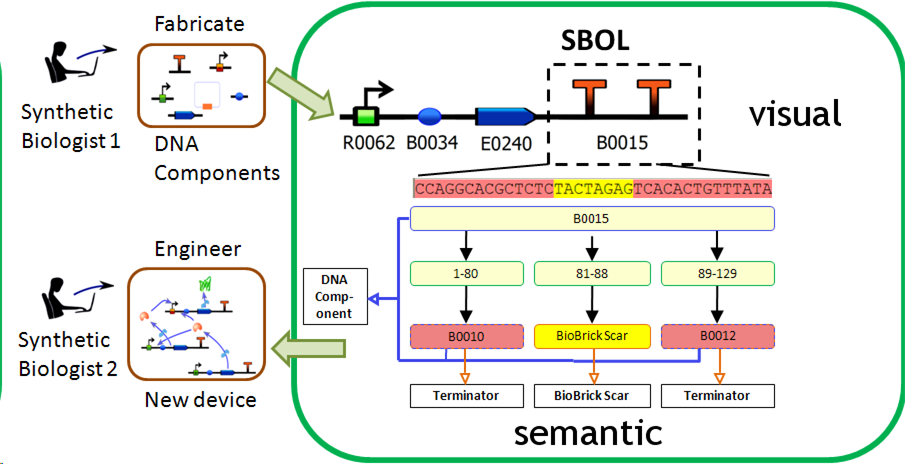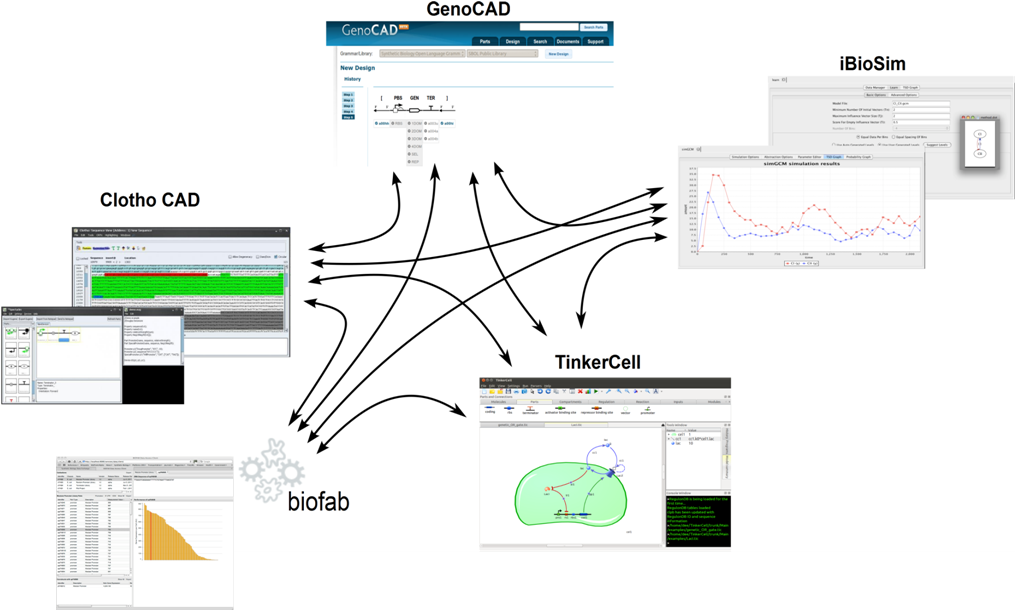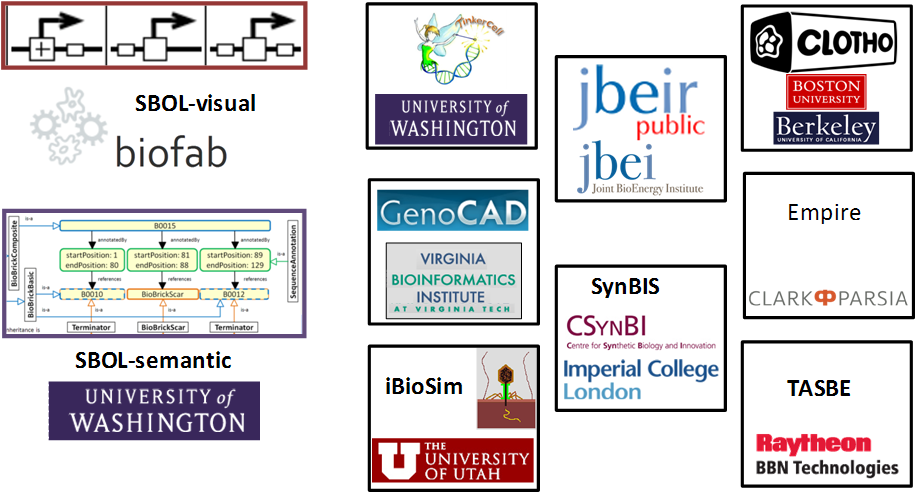Team:BU Wellesley Software/SBOL
From 2011.igem.org
(Difference between revisions)
| Line 98: | Line 98: | ||
<h1>SBOL Overview</h1> | <h1>SBOL Overview</h1> | ||
The Synthetic Biology Open Language <a href="http://www.sbolstandard.org/">(SBOL)</a> is an emerging standard which attempts to describe the information used in synthetic biological designs. SBOL has two components: SBOL semantic and SBOL visual. Semantic captures the organization and types of data comprising a design. Visual provides iconography for biological concepts such as promoters, ribosome binding sites, and terminators. SBOL is a community driven standard and a governance board. It is important that software tools begin to incorporate SBOL in order to begin the process of unifying the synthetic biology design community. | The Synthetic Biology Open Language <a href="http://www.sbolstandard.org/">(SBOL)</a> is an emerging standard which attempts to describe the information used in synthetic biological designs. SBOL has two components: SBOL semantic and SBOL visual. Semantic captures the organization and types of data comprising a design. Visual provides iconography for biological concepts such as promoters, ribosome binding sites, and terminators. SBOL is a community driven standard and a governance board. It is important that software tools begin to incorporate SBOL in order to begin the process of unifying the synthetic biology design community. | ||
| - | <br><center><img src="http://cs.wellesley.edu/~hcilab/iGEM_wiki/images/SBOL/SBOL1.png" height="300" width="675"> <p><i>SBOL Overview</i></center> | + | <br><center><img src="http://cs.wellesley.edu/~hcilab/iGEM_wiki/images/SBOL/SBOL1.png" height="300" width="675"> <p><i>SBOL Overview. Here we see both the visual iconography as well as the semantic standard by which a design is decomposed into components and features.</i></center> |
<br> | <br> | ||
</div> | </div> | ||
<div id="results"> | <div id="results"> | ||
<h1>Plan</h1> | <h1>Plan</h1> | ||
| + | In our project we incorporated SBOL by using the Clotho design environment. Clotho supports SBOL via its "Hermes" app. Hermes is compliant with the libSBOL - Java implementation of the SBOL Core Data Model <a href="https://github.com/synbiodex">(link)</a>. Hermes allows for both the import and export of data in SBOL. For example, a design in Clotho comprising Clotho features and Clotho Parts can be exported to SBOL. The process is "lossy" however as SBOL does not currently support all of Clotho's core object's information. Likewise SBOL data can be imported into Clotho to create new Clotho Feature and Part objects. This process is "underspecified" as again not all information for the Clotho object's instantiation is provided by SBOL. The missing data defaults to pre-specified values currently. | ||
| + | |||
| + | This process is powerful because it will allow Clotho to share designs with tools such as Tinkercell, GenoCAD, and iBioSim. | ||
<br><center><img src="http://cs.wellesley.edu/~hcilab/iGEM_wiki/images/SBOL/SBOL2.png" height="450" width="750" > <p><i>Tools communicate via SBOL</i></center> | <br><center><img src="http://cs.wellesley.edu/~hcilab/iGEM_wiki/images/SBOL/SBOL2.png" height="450" width="750" > <p><i>Tools communicate via SBOL</i></center> | ||
<br> | <br> | ||
Revision as of 23:53, 27 September 2011
SBOL Integration
SBOL Overview
The Synthetic Biology Open Language (SBOL) is an emerging standard which attempts to describe the information used in synthetic biological designs. SBOL has two components: SBOL semantic and SBOL visual. Semantic captures the organization and types of data comprising a design. Visual provides iconography for biological concepts such as promoters, ribosome binding sites, and terminators. SBOL is a community driven standard and a governance board. It is important that software tools begin to incorporate SBOL in order to begin the process of unifying the synthetic biology design community.
SBOL Overview. Here we see both the visual iconography as well as the semantic standard by which a design is decomposed into components and features.
Plan
In our project we incorporated SBOL by using the Clotho design environment. Clotho supports SBOL via its "Hermes" app. Hermes is compliant with the libSBOL - Java implementation of the SBOL Core Data Model (link). Hermes allows for both the import and export of data in SBOL. For example, a design in Clotho comprising Clotho features and Clotho Parts can be exported to SBOL. The process is "lossy" however as SBOL does not currently support all of Clotho's core object's information. Likewise SBOL data can be imported into Clotho to create new Clotho Feature and Part objects. This process is "underspecified" as again not all information for the Clotho object's instantiation is provided by SBOL. The missing data defaults to pre-specified values currently. This process is powerful because it will allow Clotho to share designs with tools such as Tinkercell, GenoCAD, and iBioSim.
Tools communicate via SBOL
Future Work

SBOL is a continuing collaboration between a variety of research groups.
 "
"
